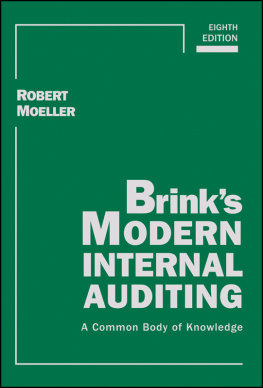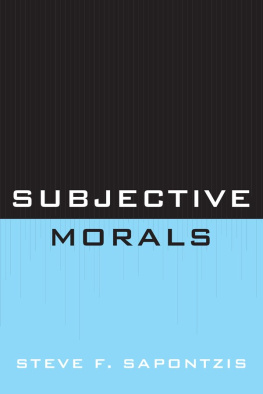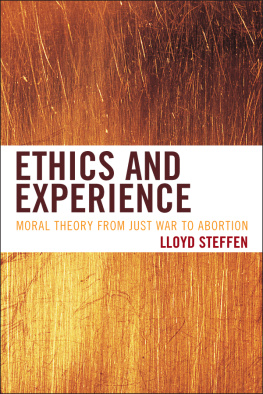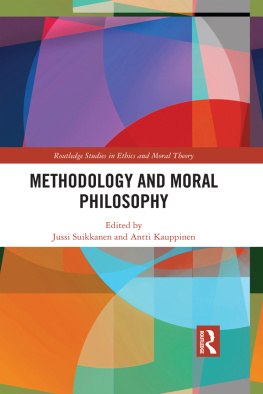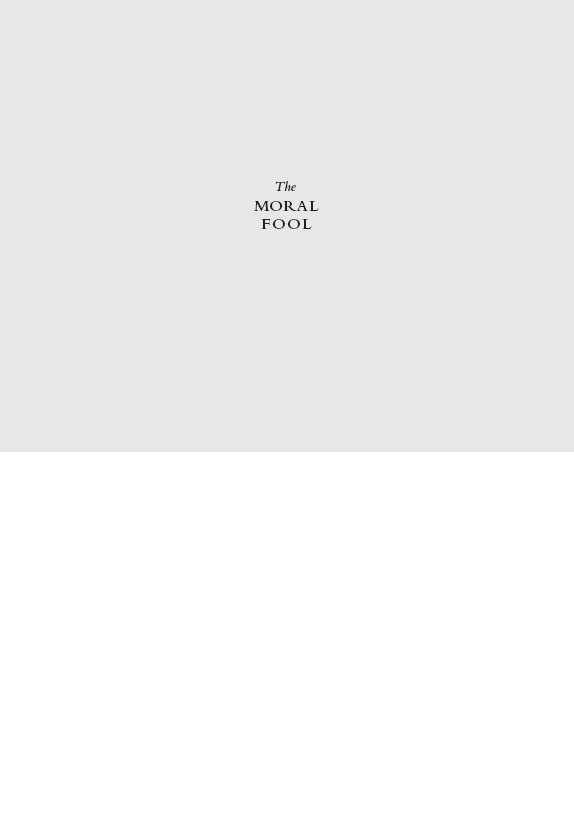The moral fool: a comparative case for amorality / Hans-Georg Moeller.
p. cm.
Includes bibliographical references and index.
ISBN 978-0-231-14508-4 (cloth: alk. paper) ISBN 978-0-231-14509-1
(pbk.: alk. paper) ISBN 978-0-231-51924-3 (e-book)
1. Social ethics. 2. Moral conditions. 3. Social values. I. Title.
A Columbia University Press E-book.
CUP would be pleased to hear about your reading experience with this e-book at .
References to Internet Web Sites (URLs) were accurate at the time of writing. Neither the author nor Columbia University Press is responsible for Web sites that may have expired or changed since the book was prepared.
God save us always, I said, from the innocent and the good.
THE PRESENT BOOK IS very similar in content to a recent publication by Gnter Wohlfart, a longtime colleague and friend. The title of Gnters book is Die Kunst des Lebens und andere Knste: Skurrile Skizzen zu einem eurodaoistischen Ethos ohne Moral (The Art of Living and Other Arts: Ludicrous Sketches of a Euro-Daoist Ethos without Morality) (Berlin: Parerga, 2005). He is currently working on another manuscript discussing similar issues. Its tentative title is Moralphilosophische Splitter. In the notes I referred to Gnters work only a couple of times, but my whole approach toward Daoism, ethics, and philosophy in general has been shaped to a great extent by exchanges with and cooperation from Gnter during the past fifteen years.
I am deeply indebted to Ryan ONeill for agreeing to help me out again with my English. Ryan not only corrected many linguistic errors but also relentlessly cut what was mere repetition, what was not really necessary to say, and what was better left unsaid.
The following friends and colleagues read the manuscript in whole or in part and provided detailed criticisms and suggestions for changes: Hannes Bergthaller, Paul DAmbrosio, Jay Goulding, John Maraldo, Franklin Perkins, Rolf Trauzettel, and Gnter Wohlfart. I am also grateful to a number of students at Brock University who discussed with me the ideas presented in this book.
Many thanks to Anne R. Gibbons for her careful editorial work and her encouragement, and to Wendy Lochner and Christine Mortlock at Columbia University Press for their support and advice.
Finally, I thank Brock University for providing generous research funds.
This time, I asked my wife if, as is often seen in other books, she would like to be thanked in the acknowledgments. She said she did not really know what she should be thanked for and, instead, would rather have me give her my royalties.
Es ist klar, dass sich die Ethik nicht aussprechen lt.
(It is clear that ethics cannot be expressed.)
Ludwig Wittgenstein, Tractatus Logico-Philosophicus, 6:421
HARDLY ANY POLITICAL PURGE, religious war, or ethnic cleansing was not justified, embellished, or inspired by great moral values: justice, righteousness, freedom, liberty, equality, human rightsyou name it. Robespierre, Hitler, and Pol Pot all acted in the name of virtue. When people kill each other, especially on a massive scale and in organized fashion, ethics are usually held in high esteem. It is much easier to murder a man if you believe that he is eviland that you are good. Of course, the defenders of ethics will say: Well, so what, no moral value is immune to abuse. But what is abuse? An ax can be used for cutting down an old oak tree that will keep your house warm in the winter. It can be used to split the skull of a criminal who attacks your family; it can be used to cut off the head of a man sentenced to death. It can be used to assassinate a tyrant. It can be used to kill your enemies in war. It can be used to break into a rich mans home. It can be used to torture a terrorist. It can be used to take deadly revenge. Where does its use end and its abuse begin? What are the rules for the use and the abuse of a tool? Who defines these rules, and when do they apply? Morality is a tool. It is not, unlike an ax, used for splitting things into halves, but for dividing people into two categories: the good and the bad. It is a rhetorical, psychological, and social tool. To say it can be used and abused is the same as to say: It is not guns that kill, but people. I do not believe in this logic. Axes and guns are not innocent. The categories of innocence and guilt do not apply to tools.
This book does not say, Abolish morality! That would make as much sense as saying: Abolish all axes! (or guns, for that matter). But it does question the commonly held belief that morality is, in and of itself, a good thing. It is not. It is not more of a good thing than an ax or a gun. My main issues are Who says that morality is good? Why do people say this? How is morality used? And, Do the answers to these questions suggest that morality is inherently good? Are there different kinds of distinguishing between good and bad, and what kind of good/bad distinction is the moral one?
The goodness of morality normally goes unquestioned. But isnt it a circular argument to say that to distinguish between good and evil is good rather than evil? How can it be morally good to make such a distinction? If it is, then moral goodness would paradoxically justify itselfor be simply evident. I think that the historical figures Robespierre, Hitler, and Pol Pot sufficiently demonstrate that morality is neither necessarily nor evidently good.
To say the opposite, that morality is evil, would be equally absurd. It would be just as absurd as saying that an ax or a gun is in and of itself evil. It would be as absurd as saying, It is guns that kill, not people. The absurdity of one statement does not make its opposite necessarily truer. That axes or guns are not innocent does not make them guilty. None of these categories apply.
What I argue here is that one cannot say that morality is good or evil. Similarly, one cannot say that an ax or a gun is good or evil. I question the fundamental validity of such general ethical judgments. But my argument is not merely nihilistic. I also suggest that moralityor ethicscan be dangerous and that it may be advisable to be cautious with it. I say this because the idea is so often overlooked. In my profession, academic philosophy, interest in ethics has been, as in society on the whole, very much on the rise in recent years. If you want a job as a philosophy professor it is, nowadays, best to specialize in ethics: in the history of ethics, applied ethics, business ethics, bioethics, gender ethicsthe list is growing all the time. Ethics are in vogue. Politics and the mass media are all concerned with ethics. Even the economy is nowadays supposed to consider ethical questions. And in every case it is presupposed that ethics are ethically good.

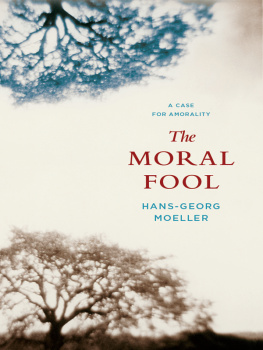
![Moeller - Creative slow-cooker meals: [use two slow cookers for tasty & easy dinners]](/uploads/posts/book/220959/thumbs/moeller-creative-slow-cooker-meals-use-two-slow.jpg)
